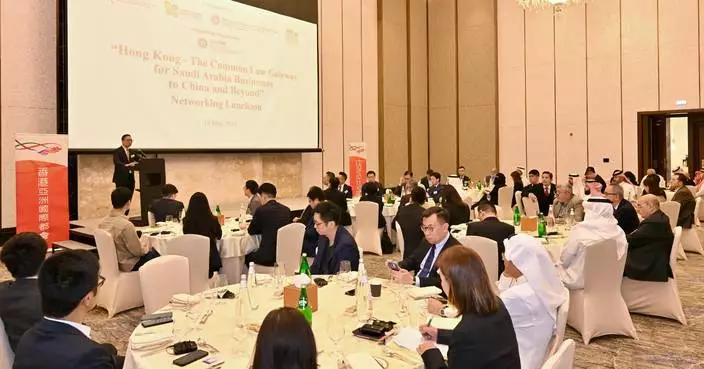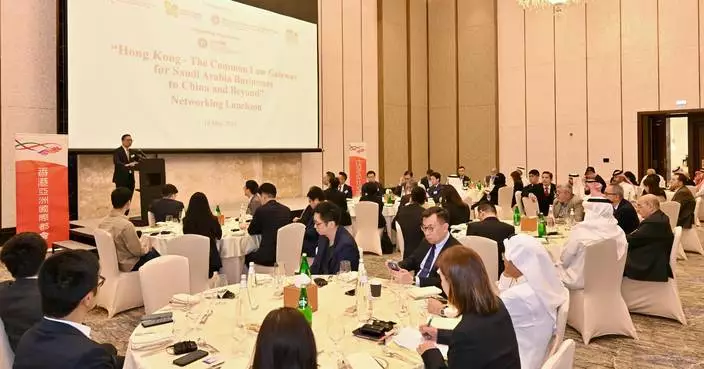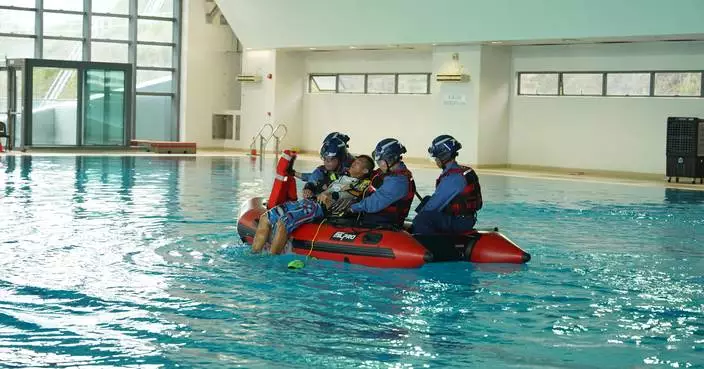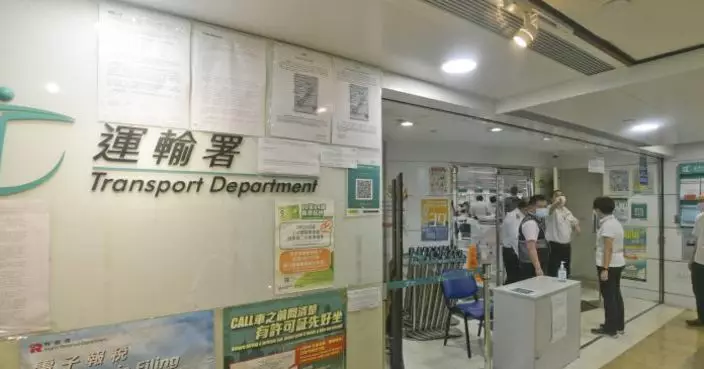Breaking barriers: the future of cross-boundary medical collaboration - lcq14
Following is a question by the Hon Stanley Li and a written reply by the Secretary for Health, Professor Lo Chung-mau, in the Legislative Council today (May 8):
Question:
Many members of the public have indicated that the waiting time for specialist outpatient services and related medical examination services at public hospitals is excessively long. Regarding cross-boundary medical co-operation, will the Government inform this Council:
(1) whether it knows the average waiting time for various examination services (e.g. Computed Tomography and Magnetic Resonance Imaging) at public hospitals in the past five years;
(2) given that the Government launched the Pilot Scheme for Supporting Patients of Hospital Authority in Guangdong-Hong Kong-Macao Greater Bay Area last year to enable eligible patients of the Hospital Authority to receive subsidised consultation services at the University of Hong Kong-Shenzhen Hospital, whether the Government will consider extending in the near future the healthcare institutions in which such patients can receive consultation services to Mainland hospitals accredited under the China's International Hospital Accreditation Standards (2021 Version) (the Accreditation Standards) (accredited Mainland hospitals) and hospitals of Tier 3 Class A in the Mainland cities of the Guangdong-Hong Kong-Macao Greater Bay Area; if so, of the details; if not, the reasons for that;
(3) in order to alleviate the burden on the public healthcare system in Hong Kong, whether the Government will consider recognising the medical records issued by the accredited Mainland hospitals, and publishing the list of accredited Mainland hospitals for public reference; if so, of the details; if not, the reasons for that;
(4) whether the Government will consider referring members of the public who have needs for specialist services to the accredited Mainland hospitals for further examinations if they so wish; if so, of the details; if not, the reasons for that; and
(5) whether the Government will consider co-operating with more Mainland cities to build more healthcare institutions on the Mainland that adopt the Hong Kong management model and are accredited under the Accreditation Standards, so as to promote cross-boundary medical co-operation; if so, of the details; if not, the reasons for that?
Reply:
President,
In consultation with the Hospital Authority (HA), the consolidated reply to the question raised by the Hon Stanley Li is as follows:
(1) The HA will determine the priority of patients' attendance at Specialist Out-patient Clinics (SOPCs) according to their clinical conditions and arrange correspondingly the necessary investigation services. The waiting time for various diagnostic radiological investigation services of public hospitals in the past five years is set out in the Annex.
(2) to (5) Under the principle of complementarity and mutual benefits, the Government promotes healthcare collaboration in the Guangdong-Hong Kong-Macao Greater Bay Area (GBA) with a view to fully leveraging the composite advantages of the three places, and jointly improving the standards and development of different aspects of healthcare in the GBA.
One area of the Government's work in the aspect of healthcare co-operation in the GBA is to explore supporting the healthcare needs of Hong Kong residents who have close ties with the Mainland cities in the GBA through co-operation with suitable GBA healthcare institutions. Amongst such work, the Government has allowed the elderly to use the Elderly Health Care Vouchers (EHCVs) to pay for the fees of designated out-patient healthcare services at the University of Hong Kong-Shenzhen Hospital (HKU-SZH) since 2015. Such an arrangement has been regularised in 2019 and extended to the Huawei Li Zhi Yuan Community Health Service Center of the HKU-SZH in April last year. To offer eligible Hong Kong elderly persons additional options of service points for using EHCVs in the GBA, the Government also announced in February this year the inclusion of five integrated medical institutions in the GBA into the Elderly Health Care Voucher Greater Bay Area Pilot Scheme. The pilot medical institutions are expected to gradually launch the relevant arrangements starting from the third quarter of this year. Together with the two service points of the HKU-SZH, there will be a total of seven integrated medical institutions in the core cities of the GBA with full coverage along the river, taking care of the retired elderly persons living in the Guangdong province.
In addition, making reference to the experience from a special support scheme during the COVID-19 epidemic, the Government also launched the Pilot Scheme for Supporting Patients of the Hospital Authority in the Guangdong-Hong Kong-Macao Greater Bay Area (Pilot Scheme) on May 10 last year, so that patients with scheduled follow-up appointments at designated SOPCs or General Out-patient Clinics (GOPCs) of the HA may receive subsidised consultations at the HKU-SZH. At present, the Pilot Scheme covers major SOPC and GOPC services provided by the HA, including anaesthesiology (pain clinic only); cardiothoracic surgery; clinical oncology; ear, nose and throat; eye; gynaecology; internal medicine; neurosurgery; obstetrics; orthopaedics and traumatology (orthopaedics); paediatrics; and surgery. The Government has earlier announced that the Pilot Scheme will be extended to March 31 next year, and will consider the continuation of the Pilot Scheme and future arrangements subject to the actual effectiveness of the scheme.
To further optimise the use of healthcare resources in the GBA, "The Chief Executive's 2023 Policy Address" also put forward strategic purchasing of healthcare services from suitable GBA healthcare institutions for Hong Kong citizens, with a view to alleviating the service pressure of public hospitals in Hong Kong and shortening the waiting time of citizens. The Government is currently exploring with suitable GBA healthcare institutions the arrangements for purchasing healthcare services. The initial idea is to start with healthcare services with immense demand and of lower risks, such as investigation or imaging services, and devise the service model for the purchase and specific arrangements under the premise of compliance with relevant laws and regulations of both places. As the healthcare needs, relevant laws and regulations as well as regulatory regimes for the healthcare professions of Hong Kong and the Mainland are different, the Government needs to carefully consider the service arrangements and modes of professional collaboration with the relevant Mainland organisations in the course of procurement of healthcare services, and gradually expand room for co-operation, with a view to ensuring that the procurement arrangements are practicable and will be beneficial to both sides.
In respect of health records, to dovetail with cross-boundary healthcare collaborations and to support cross-boundary healthcare needs of Hong Kong citizens, the Government has all along been enabling citizens to carry their electronic health records (eHRs) for cross-boundary uses through various means to allow more accurate diagnosis and treatment, in accordance with the overarching principles of ensuring due compliance of laws and regulations of both places and that data security and patients' privacy are fully safeguarded. Health records of patients are personal data. In the process of enhancing data portability, the Government will duly consider the compatibility of the systems, safeguards on privacy, data security and compatibility of laws and regulations of both places, with a view to unleashing the potential of cross-boundary health data use in a step-by-step manner.
At present, citizens may view important health records including medications, allergies and adverse drug reactions, appointments and investigations on the mobile application of the Electronic Health Record Sharing System (eHealth). Citizens may also apply for copies of their individual electronic health records (eHRs) stored in eHealth in paper or electronic format for sharing with non-local healthcare service providers. The Government has also launched a special measure such that citizens joining the Pilot Scheme may authorise the HKU-SZH to obtain and use copies of their eHRs in eHealth (including laboratory test results and radiology reports), thereby enabling healthcare personnel in both places to provide healthcare services to them. The Government will extend the relevant arrangements to other cross-boundary collaboration projects launched or recognised by the Government.
Under the five-year plan of eHealth+, the Government will introduce a new function to allow citizens to retrieve their own eHRs stored in eHealth directly through the eHealth mobile application and to store their health records obtained when seeking medical attention outside Hong Kong in their personalised eHealth accounts, so as to allow members of the public to keep and use their personal medical records from within and outside Hong Kong.
The Government will continue to closely monitor the progress of various healthcare collaboration initiatives and explore various feasible measures under the principle of complementarity and mutual benefits with a view to supporting the medical needs of Hong Kong citizens more effectively. These include exploring extension of the collaboration scope of relevant initiatives to other Mainland healthcare institutions in the GBA. In the process, the Government will consider the service standards and clinical governance structure of those healthcare institutions, including whether they adopt the "Hong Kong management model" as well as healthcare institutions accredited under the China's International Hospital Accreditation Standards (Note). The Government's policy objective is to enable Hong Kong people who travel between or reside in the two places and some of those who intend to settle in the GBA to reside and integrate into local life, instead of solely relying on healthcare resources in the Mainland to meet the needs of Hong Kong people. At the same time, the Government will continue to take forward measures that are conducive to building up and improving standards of the overall healthcare manpower pool in the GBA. For example, through talent exchange programmes, healthcare professionals in the GBA are offered good opportunities to learn from each other and raise clinical work standards, so that healthcare manpower resources of the three places can be jointly developed for the benefit of the people, and, to a certain extent, alleviating the pressure of manpower shortage in local public hospitals.
Note: The China's International Hospital Accreditation Standards were jointly developed by hospital accreditation experts from Hong Kong and the Mainland with the national "Tier III Class A" hospital accreditation standards as the basis according to the requirements of the International Society for Quality in Health Care while drawing on international experience, serving as the nation's first internationally recognised hospital accreditation standard.

Source: AI-generated images
Unlocking opportunities: how hong kong's common law can propel saudi businesses into the chinese market and beyond
Following is the speech by the Secretary for Justice, Mr Paul Lam, SC, at the lunch and networking reception titled "Hong Kong - The Common Law Gateway for Saudi Arabia Businesses to China and Beyond" in Riyadh, Saudi Arabia, today (May 19, Riyadh time):
Distinguished guests, ladies and gentlemen,
Firstly I would like to express my gratitude and to welcome all of you to this networking luncheon organised by the Department of Justice together with other organisations as the MC has just said. I wish just to take the opportunity to say a few things to explain why we are here and what we need to achieve. But let me begin by making one very important point: today's lunch has a very special meaning to me and to my delegation from Hong Kong because there are many "firsts".
This is the first time I lead a delegation consisting of lawyers and members from other business sectors on an overseas trip after I became the Secretary for Justice in July 2022. This is the first "first". The second "first" is that as to this particular trip to the Middle East, Saudi Arabia is our first destination. So that our first destination is the second "first". The third "first" is that we just arrived this morning around 3am, some arrived a little later at 4am or 5am. And this particular lunch is in fact the first event for the whole trip including that in Saudi Arabia. So it is going to be very memorable. As there is a Chinese saying, because we have a lot of friends coming from the Mainland China, a good beginning means 50 per cent of your success. So I am truly very honoured and very pleased to see so many guests from Saudi Arabia and also representatives of enterprises, organisations from Mainland China in Saudi Arabia and to come here to join this lunch.
Now coming to the purpose of this lunch, and perhaps this trip. Obviously, as the minister of justice of Hong Kong, I am trying to tell you a little bit more about the legal service in Hong Kong, what we can offer, but, more importantly, we have to start by making friends. We have to start by building personal relationship. In order to build a personal relationship, the very first thing we need to do is to introduce ourselves.
My delegation consists of, I don't remember the exact number, but probably maybe around 40 including all my supporting staff. Now the combination is quite unique. Firstly, we have people coming from the Government, not just from the Department of Justice in which I am working, I am joined by representatives of Invest Hong Kong which is a branch of the Government responsible for promoting investment, colleagues coming from the ETO (Hong Kong Economic and Trade Office) all the way from Dubai, for they are responsible for promoting trade around the world. And then we have representatives from the Hong Kong Trade Development Council which is a statutory body also responsible for promoting trade. So we have numerous organisations trying to work together to enhance Hong Kong's relationship with other jurisdictions.
Apart from representatives coming from the Government, we have very strong representatives from the private sector. We have more than around say 15 lawyers who are really the top lawyers in Hong Kong. They specialise in doing both contentious and also non-contention business. We have experts doing IPOs (initial public offerings), M&A (mergers and acquisitions), and we also have experts in arbitration or litigation. So we have whole spectrum of legal eagles in this room. And on top of that, I have also invited representatives from the Hong Kong Stock Exchange and Hong Kong International Arbitration Centre to be here.
Now you may wonder why instead of simply asking my colleagues to come here, which is much easier to organise this trip, why I have invited so many friends to come here. The reason is very simple, because I wish to demonstrate to people, our friends in Saudi Arabia, that Hong Kong is really an ideal place to provide one-stop professional legal service from the time you think of setting up a business in Hong Kong for exploring opportunities in Mainland China, up to the very end when unfortunately some disputes arise, and then you have to consider where and how to resolve the disputes. We offer a sort of packaged professional services from the very beginning until the very end. And the representatives of this delegation, they are experts at different stages of these whole business cycle, so to speak.
Now, maybe you have noticed that we have a theme for the talk, and in fact, that is also the theme I am going to use throughout my trip. It goes something like "Hong Kong - The Common Law Gateway for Saudi Arabia Businesses to China and Beyond". I think "gateway" simply symbolised the fact that Hong Kong is playing a very important role of connecting Saudi Arabia and the Middle East with not just Hong Kong itself. Hong Kong is not just a destination, it is also a springboard or place that can take you to other parts of China so that you can explore opportunities in the whole country.
Now, what is perhaps a little bit unusual is that I have deliberately add the word "common law" before the word "gateway". And here comes the important point, because as the person responsible for promoting legal services in Hong Kong, this is really the point that I wish to emphasise at this lunch. Now, why is this so important? Why is it of interest to friends in Saudi Arabia?
To answer the question, perhaps I have to step back and talk a little bit about the history of Hong Kong. I am sure most of you would be aware of what I am going to say, but it is worth repeating now. I am sure that those of you would be aware of the fact that Hong Kong used to be ruled by the British for more than 100 years between 1842 until June 30, 1997. Now, the important thing is that during this period of British rule, the British introduced the common law system to Hong Kong and that common law system developing for a century has become extremely reputable and well-established. And what happened on July 1, 1997 is that China resumed sovereignty of Hong Kong. China decided to resume sovereignty in a very unique manner which was unprecedented in human history, that is by introducing the concept or principle of "one country, two systems", which means that Hong Kong shall maintain and preserve its common law system. So we are still using the common law system in Hong Kong, which is entirely different from the civil law system used in other parts of China.
You may then ask: why is the common law system so significant? How is it relevant to your business or investment interests? Now, I wish to highlight four important characteristics perhaps we ought to bear in mind.
The first characteristic that I wish to stress is that we have a very trustworthy, very credible, very reliable and reputable judicial system. Under the mini-constitution of Hong Kong, which is called the Basic Law of Hong Kong, the courts of Hong Kong enjoy independent power of adjudication, including the Court of Final Appeal in the power of final adjudication. That means in every litigation of court proceedings in Hong Kong, it always ends in Hong Kong, it never goes beyond Hong Kong.
And a very special feature that is also worth mentioning is that in our Court of Final Appeal, which is the highest court in Hong Kong, we have invited at the moment 10 overseas judges, very eminent retired judges from other jurisdictions, to sit as our part time judges. A very recent appointment is a retired federal judge from Australia. We also have retired judges from England, from Australia, from Canada. Before their retirement, they used to be the chief justice of their respective jurisdiction. And I think that firstly it is a vote of confidence of judges from other jurisdictions in the legal system of Hong Kong. And secondly, it is a symbol and the indication of the quality of justice that the Hong Kong judicial system can offer. So this is my first point.
The second point is that the Hong Kong legal system offers a very secure and safe regulatory system to safeguard your financial interests. Under our Basic Law, which a constitutional document, we guarantee private property right. So no one can expropriate your property, not even the government under no circumstances can they take away your property at their own discretion. And then free flow of capital is guaranteed. Money can come in Hong Kong and leave Hong Kong freely. So it is a very, very friendly environment for funds to move in and to move out. But at the same time, we also have a very strict regulatory framework to ensure that misconduct or malpractices will not be permitted. So this is to strike a balance to ensure free flow of capital and at the same time to ensure that your money, your investments and financial interests will be sufficiently protected.
The other thing is that when it comes to law enforcement, Hong Kong is regarded as one of the cleanest place in Hong Kong. So corruption or other sort of malpractice that might exist in some other places in the world is not an issue in Hong Kong. So putting aside a similar framework in practice, it's applied and enforced very straightly and properly.
So then go to my third point. My third point is that our legal system is extremely business friendly. Business friendly in the sense that the content of our law is extremely similar to the civil and commercial law that we found in most other countries, in particular in the western world, say the United States and the UK and western Europe. And the simple reason is because of the common law tradition that I have mentioned. Most of our civil and commercial law, for example company law and contract law, the content is almost identical to what you may have in England, Australia and New Zealand. So the important thing is that our set of law is extremely familiar to the international business community. But at the same time, apart from maintaining our tradition, we try to ensure that our law will be updated to meet the new demands. So very recently we have introduced a new legislation to encourage people to set up, for example, family office in Hong Kong by providing tax advantages. And there are also other measures to ensure that we can provide a very attractive environment at the same time to give you the sort of protection that you deserve. Ms Alpha Lau, the Director-General of Invest Hong Kong, is going to speak after me. I am sure that she can provide more details in this respect.
But apart from the substantive law, what is equally important is that we have a very strong pool of legal talent in Hong Kong. I mentioned earlier that more than 15 lawyers come with me and that by itself is an evidence on the strength of the legal profession. We have a divided legal profession in Hong Kong consisting of barristers and solicitors. Barristers are specialists in doing contentious business. They go to court most of the time, they also take part in arbitration and mediation. And then the solicitors, they are more general in practice. They will be responsible for non-contentious matters, say M&A, IPO, providing advisory work, so on and so forth. So what I wish to emphasise is that we have a big pool of top-quality professionals who stand ready to serve your interests. And one thing that we must bear in mind is that most of these legal professionals are bilingual, many of us are Chinese, of course we have a lot of expatriates. Because of the unique situation in Hong Kong, apart from being very familiar with the international legal community, we are also extremely familiar with how things are done in Mainland China, both the culture and the business environment. So I think that is also an advantage that would work in your interests.
Now the fourth point that I would like to mention about our legal system is that it provides very close connection to both Mainland China and other parts of the world. Now firstly, in particular, I would like to speak on how Hong Kong's legal system is connected to the Mainland because this is a feature that cannot be copied or found elsewhere. I said earlier on that under the principle of "one country, two systems", Hong Kong's legal system is different or separate from that of the Mainland, but it doesn't mean that there is no connection between the two legal systems within the same country. Quite the contrary, we have at the moment nine mutual legal assistance arrangements that connect the two jurisdictions together. And these connections, based on the mutual legal assistance agreements are of great significance to safeguard the interest of investors and businessmen from overseas. I can give you a very simple example. Based on some of the arrangements that I mentioned, a court judgment in Hong Kong for an arbitral award in Hong Kong can be recognised and enforced in the Mainland. So if your business partner is in Mainland China, your assets there that you have to protect, but you wish to take advantage of Hong Kong legal system because you have confidence in our legal system, then Hong Kong is the right choice. You can use our legal system, but you can enjoy the fruit of success of the legal process in Mainland China. Now these legal arrangements are unique to Hong Kong. It is only made possible because of the "one country, two systems" arrangement. So if you go to places like, just as an example Singapore or other places, then you will not find exactly this same sort of co-operation, arrangement or convenience.
So putting these four characteristics together, I would have thought that you will be convinced to a certain degree that Hong Kong is definitely a place for you to consider to act as a platform, a connector, a springboard for you to go into the market in Mainland China and beyond. I said "beyond" because we are all aware of the development and relationship between Middle East and China, including in particular the relationship between Saudi Arabia and China. We have very long friendship going back for more than 1 000 years. Of course I am referring to the Silk Road. But I note that in June 2023, last year, your investment minister said in a very important conference that there would be a modern silk road between Arab countries, including of course, Saudi Arabia, and China. So "silk road" is not something belonging to history. It is not about the past. It is also about our common future. So Hong Kong plays a very significant role in fostering a better relationship between the two countries because of the unique characteristics offered by "one country, two systems".
And as you may note, last February the Chief Executive of Hong Kong came here with a strong delegation, I remember it's almost 100 persons from different sectors. A lot of agreements have been signed, and a lot of initiatives. And after that, many colleagues from the Government in different areas have come to Saudi Arabia. So it is now my turn, basically. And we are talking about setting up an ETO, economic and trade office, in Saudi Arabia in Riyadh. I hope it will come into reality soon. But the future is very clear, the direction is very clear. I am very confident and I hope that you are equally confident that the relationship between Saudi Arabia and Hong Kong is going to be very strong and much closer than today. But it requires some efforts. So I am sure that each and every one of us in this room can make some contributions to make what we have in mind to come true as soon as possible. It is a bit a pity that we only have about two hours or so at this lunch to make friends, to talk about things of common interests. It may be a very small step in the overall scheme of things, but I do believe that this is the small step that will take us closer to our final destination.
So lastly, I wish you all a very enjoyable lunch. I hope we can make some friends and enhance our relationship. If you have any question on Hong Kong, I am sure that my friends from Hong Kong sitting at the table will be more than happy to entertain all the questions. And I am very confident that they will have good answers. And obviously, we are also very interested to hear from you about your situation in Saudi Arabia. I think to make friends, we have to know each other first. So thank you very much.

Speech by SJ at lunch and networking reception titled "Hong Kong - The Common Law Gateway for Saudi Arabia Businesses to China and Beyond" in Riyadh, Saudi Arabia Source: HKSAR Government Press Releases










